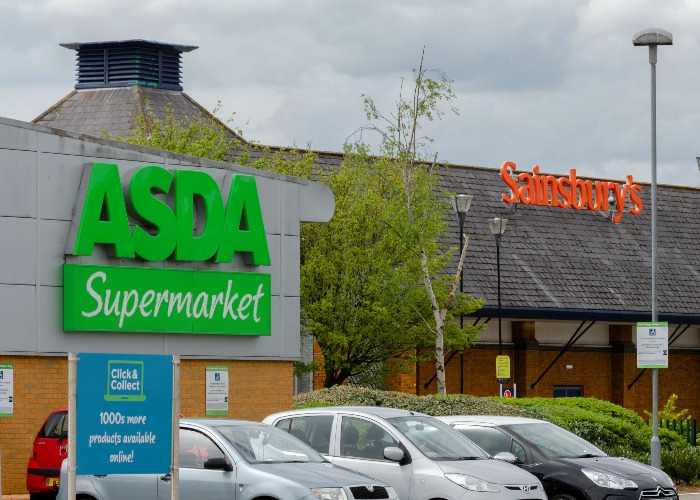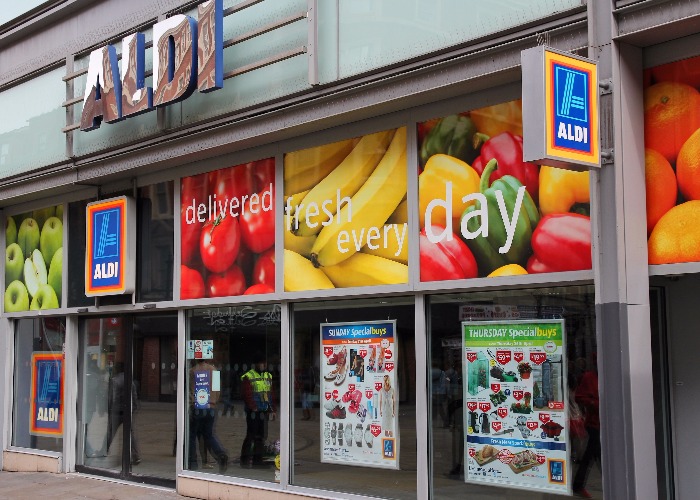Sainsbury’s/Asda merger: should you invest in supermarkets?

It’s been an exciting week for groceries, with Tesco, Morrisons and Aldi also stepping up – but experts aren't buying the hype.
It’s all change for the UK’s supermarkets.
Sainsbury's has confirmed plans to merge with rival Asda in a multi-billion pound deal to create an industry giant with combined revenues of more than £50bn.
The tie-up, which is expected to complete at the end of next year, values Asda at £7.3bn and will give the new entity around 30% of the UK grocery market.
Mike Coupe, CEO of Sainsbury’s, described it as an opportunity to establish a new force in UK retail.
“It will create a business that is more dynamic, more adaptable, more resilient and an even bigger contributor to the UK economy,” he said.
Why is this happening?
It’s the latest chapter in a story of reinvention for a sector that has long-divided opinion among investors due to miserable share price performance.
Price competition from cut-price rivals Aldi and Lidl, changing shopping habits, and squeezed margins from a weaker sterling have made life tough for the established supermarkets.
In fact, Aldi was recently named the nation’s favourite supermarket in an influential annual survey from consumer group Which?

Its special offers, the quality of fresh and own-label products, and the ease of finding items on its shelves were enough to hand it the top spot.
Alex Neill, Managing Director of Which? Home Products and Services, said rising food costs had led shoppers to vote with their feet and wallets.
“The big four supermarkets need to up their game or risk losing their customers to other supermarkets who are doing a better job of giving people what they want,” he said.
Unsurprisingly, senior executives at rival supermarkets have been under increasing pressure to come up with innovative ways to encourage shoppers through their doors.
As well as cutting their prices they are looking for ways to cut costs, strike more advantageous deals with wholesalers, and expand their operations.
For example, Sainsbury's has taken over Home Retail Group, which owns Argos and Habitat, while Tesco took over Booker, the wholesaler.
It’s a point highlighted by Laith Khalaf, senior analyst at Hargreaves Lansdown, who believes the latest proposed merger could trigger yet another punishing price war.
“Sainsbury's and Asda have clearly decided there’s strength in numbers as they battle the headwinds currently buffeting the UK retail sector,” he said.
Compare investment funds, stocks and shares ISAs and more on loveMONEY's comparison site
What will be the effect?
It’s early days but the merger could have some interesting ramifications.
“There are clear benefits from the two supermarkets joining forces, particularly when it comes to leveraging their combined buying power,” added Khalaf.
This should result in lower prices for customers and higher margins for the business, with Sainsbury's hoping to generate £350m of efficiencies.
However, such benefits won’t come overnight, according to Jonathan Pritchard, an analyst at Peel Hunt.
“Any changes/synergies will take a very long time to come through,” he said. “In the meantime, both companies may find the going relatively tough as uncertainty doesn’t breed lung-bursting on the shop floor.”
Pritchard also pointed out that the proposed deal still needs to be approved by the Competition and Markets Authority.
“There will be plenty for the CMA to tuck into here and the probability is there will be dozens of store divestments, but either way the combined group will be a powerful unit,” he said.
There is also the possibility of further agreements between the big supermarkets and smaller retailers.
Either way, these are intriguing times. “There will be rumours and counter rumours galore of all kinds,” added Pritchard. “At the moment, however, the potential impact on the quoted general retailers will be low.”
Read our piece on the major investment mistakes that most of us make.
How is the sector performing?
There are positive signs.
Figures for the 12 weeks to 25 March 2018, show grocery sales increased in value by 2.5% compared to this time last year, despite adverse weather conditions disrupting shoppers.
The discounters, Aldi and Lidl, both achieved new market share highs, according to Fraser McKevitt, head of retail and consumer insight at Kantar Worldpanel.
Growing sales by 10.7%, Aldi increased market share by 0.5 percentage points to hit a 7.3% market share, while Lidl achieved a 5.3% share after year-on-year sales growth of 10.3%.
“Aldi and Lidl are continuing to disrupt the market,” he said. “As the discounters proceed with the expansion of their store portfolios, over the past 12 weeks 63.5% of all households visited at least one of the retailers.”
Tesco experienced a sales increase of 2.4% to hold market share steady at 27.6% – attracting an additional 262,000 customers through its doors.
The retailer also saw sales growth of branded goods overtake own-label groceries for the first time since June 2015.
Morrisons also saw sales increase by 2.4% with a resulting market share of 10.4%. Growth was helped by a strong performance in online sales.
Elsewhere, Asda’s market share fell 0.2 percentage points to 15.6%, while Sainsbury’s dropped 0.3 percentage points to 15.8%, despite sales growth of 0.6%.
How the rivals compare
Tesco
Tesco has been through a challenging period, including an accounting scandal, but there are definite signs of a change in fortunes.
It has announced a 2.2% rise in UK like-for-like sales in its full-year results, with an operating profit of £1,837m – 80.6% up on the previous year.

Khalaf at Hargreaves Lansdown is optimistic about its prospects. “Tesco is enjoying a renaissance, and its turnaround plan is literally paying dividends to shareholders,” he said.
He highlighted Tesco’s purchase of wholesaler Booker, which was its strategic response to the tough trading environment and required overcoming competition concerns.
With more expected from this deal over the coming months, Khalaf believes Tesco chief executive Dave Lewis will be pleased his strategy is starting to gain traction.
“Recently the stock (price) has bounced by around 50% since its nadir in January 2016,” he said. “If Tesco can maintain its momentum in an improving market, there could be more to come.’
Are you a Tesco's shopper? Then find out how you could save money here.
Sainsbury’s
Shares initially spiked 20% when the news of the merger was announced. It may have calmed down over the following days, but it could be good news for investors.
The deal would also be great for customers who will be able to look forward to lower prices, according to Laith Khalaf at Hargreaves Lansdown.
“The prospect of Sainsbury's, Asda and Argos working together, with Walmart chipping in too, is a pretty powerful combination,” he said.
Obviously, the aforementioned looming involvement of the Competition and Markets Authority will be critical to the viability of this deal.
“The competition authorities will also note that the combined supermarket will still only have around the market share of the industry leader, Tesco, in a sector where dominance has been brutally eroded by Aldi and Lidl,” he said. “If Sainsbury’s can demonstrate the merger will create lower prices for customers, that will help too.”
Read more: Top hacks to save money at Sainsbury's.
Morrisons
The group is in its third consecutive year of growth and is due to update the market with a trading statement on May 10th.
When it unveiled its full-year results in early March, it said group like-for-like sales were up 2.8%, with reported revenues increasing 5.8% to £17.3bn.
The reforms it has carried out in recent years, which have included an increase in product ranges and store refurbishments, have attracted more customers.
Although analysts believe it’s been slow to enter the online area, they are upbeat about its partnership with Amazon and the nationwide rollout to supply McColl’s convenience stores.

Jonathan Pritchard at Peel Hunt believes Morrisons may look to secure a scale improving deal should the Sainsbury's-Asda merger take place.
“We have long suspected that the Morrisons/McColl’s wholesale link-up could be a precursor to a more formal link up, but the rumour mill suggests that Co-op could be in the frame as a partner,” he said.
Morrisons recently expanded its M Savers range and its selection of 'wonky veg'.
Are supermarkets attractive for investors?
Graham Spooner, investment research analyst at The Share Centre, finds it very hard to get excited about this sector.
“It has some defensive characteristics because we’ve all got to eat, but a lot of people have been sat on shares for a long time that have done very little,” he said.
It’s a fair point. The share prices of Tesco, Sainsbury's and Morrison are all substantially lower than they were five years ago.
It’s one of the reasons why Tesco, Sainsbury’s and Morrisons are all rated as just ‘hold’ by The Share Centre, and why it’s an area Spooner generally avoids.
“There’s just too much competition and they’re all biting one another’s hand in terms of trying to tempt us through the door,” he said. “They’re always cutting prices and costs.”
There are also question marks over other sources of competition.
“You’ve got the likes of Amazon and other massive US companies in the background that are potentially poised to enter the fray,” he said.
While he accepts the latest merger proposal has sent a wave of excitement through the sector again, he expects this to peter out over the coming months.
“This deal has got everyone focusing and talking about it again, but I think it has too many headwinds,” he said.
For more expert tips on shares, read our share tips of the week, and subscribe to loveMONEY's daily newsletter.
Comments
Be the first to comment
Do you want to comment on this article? You need to be signed in for this feature